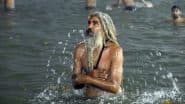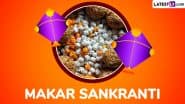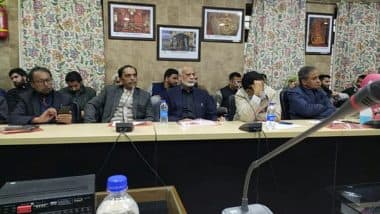Jammu and Kashmir [India], June 2 (ANI): A one-day multilingual seminar titled "Short Story in J-K: Directions and the Way Ahead" unfolded on Thursday, leaving participants inspired and eager to explore new horizons in the realm of literature.
The event, organized by the Arts Campus of the Central University of Kashmir (CUK) in collaboration with the Fiction Writers' Guild, Srinagar, saw esteemed speakers, engaging presentations, and thought-provoking discussions that celebrated the rich literary heritage of Jammu and Kashmir.
Prof Mohammad Afzal Zargar, Registrar of CUK, chaired the first session, setting the tone for the seminar.
He expressed his enthusiasm, stating, "This seminar is a testament to our commitment to nurturing literary talents and promoting cultural exchange. We are honored to host this event that brings together diverse voices in the pursuit of literature."
The keynote address was delivered by Prof Nazir Ahamd Malik, a renowned figure in the academic world.
Prof Malik emphasized the importance of storytelling, saying, "Short stories are windows into the soul of a society, capturing its essence in a compact and impactful manner. Jammu and Kashmir have a rich storytelling tradition, and it is essential to explore its various directions and pave the way for a bright future."
Dr Ishrat Mantoo, Assistant Professor in the Department of English at CUK, skillfully conducted the session, which featured three scholarly papers that offered valuable insights into the short story landscape.
DrRafia Wali presented an Urdu paper titled "Jammu Kashmir Mein Kahani Kal Aor Aaj Chand Numaendah Afsana Nigraroun Ke Hawale Se" (The Short Story in Jammu and Kashmir: Past and Present Perspectives from Eminent Storytellers).
She shared her excitement, and said, "Through my research, I aim to shed light on the evolution of short stories in Jammu and Kashmir, showcasing the brilliance of our literary luminaries who have shaped the genre."
Mushtaque B. Barq, another presenter, explored the narrative structure and techniques employed in home-grown short stories. He commented, "The art of storytelling is an intricate craft, and understanding the narrative structure and techniques employed by our local writers can provide aspiring storytellers with a solid foundation to build upon."
Dr Sohan Kaul, joining the seminar via video conference, presented a paper in Kashmiri titled "Short Story in Kashmir Literature." Dr. Kaul expressed his gratitude for the opportunity, saying, "The short story is a vibrant and integral part of Kashmiri literature. It is crucial to recognize and celebrate the unique contributions of our regional language in the realm of storytelling."
The subsequent session, guided by Prof. Mohammad Gayasuddin, Dean and HoD of Urdu at CUK, witnessed captivating readings of three evocative short stories. Nasir Zameer presented his Urdu short story titled "Shune" (Zero), which resonated with the audience. Reflecting on his experience, Zameer shared, "I am honored to present my work amongst such esteemed writers and enthusiasts. This seminar has encouraged me to continue exploring the depths of storytelling and its impact on society."
"Constellation," an English short story, left the attendees captivated. It was authored by Er. Shafi Ahmad (General Secretary Fiction Writers' Guild) who expressed, "I believe that language should not be a barrier when it comes to appreciating literature. It is heartening to see a platform that embraces multilingual storytelling, fostering unity through the power of words."
Mohi-ud-Din Reshi presented the thought-provoking Kashmiri short story "Nakh" (To shoulder). Reshi conveyed his gratitude.
"I am grateful for the opportunity to share my story in my mother tongue. It is through platforms like this seminar that we can preserve and promote our regional languages and the unique stories they hold," he said.
Dr Nusrat Jabeen, Assistant Professor in the Department of Urdu at CUK, conducted the session, skillfully navigating the discussions that followed each reading.
"The session showcased the diversity of storytelling traditions in Jammu and Kashmir. It was heartwarming to witness the deep connection between the authors and their stories, as well as the engagement of the audience," Dr Nusrat Jabeen said.
Prof Gayasuddin, in his presidential address, highlighted the significance of fiction writing and the need for aspiring writers to immerse themselves in Kashmiri and Urdu literature.
He said, "Our literature reflects the soul of our land. It is vital for budding writers to embrace their cultural heritage and explore the rich literary traditions in both Kashmiri and Urdu with equal passion."
Dr Nazir Mushtaq, President of the Fiction Writers' Guild, commended the young scholars and directed their attention to local literature.
"As writers, we must celebrate our own stories, our own languages. I urge the young scholars to dive into Kashmiri and Urdu literature with the same fervor they bring to English literature. This will deepen their understanding of our cultural roots and empower them to create powerful narratives," Dr Mushtaq added.
In addition to the engaging presentations and discussions, the seminar also incorporated a healthy question-and-answer session, adding a valuable and interactive element to the program. Participants had the opportunity to seek expert advice and clarification on different topics.
As the seminar concluded, participants expressed their gratitude for the enriching experience and called for more such events that celebrate the literary arts in Jammu and Kashmir.
The collaboration between the Central University of Kashmir and the Fiction Writers' Guild received widespread appreciation, with attendees eagerly awaiting future endeavors that promote the diverse literary heritage of the region. (ANI)
(This is an unedited and auto-generated story from Syndicated News feed, LatestLY Staff may not have modified or edited the content body)













 Quickly
Quickly

















